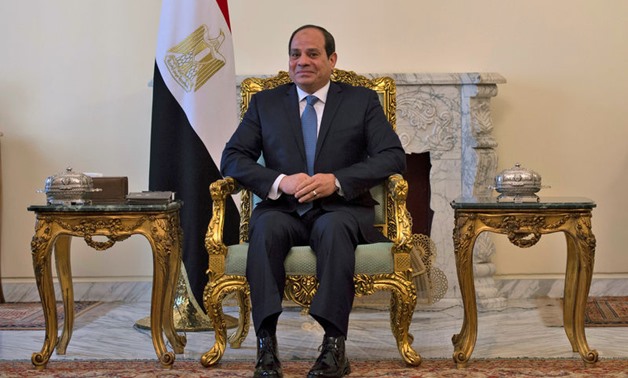
FILE- FILE - Egyptian President Abdel Fatah al-Sisi during his meeting with the U.S. Secretary of State Mike Pompeo in Cairo - Reuters
CAIRO - 8 May 2020: President Abdel Fattah El-Sisi has ratified the new amendments to the Law the Emergency Law No. 162 of 1958 which gives the president more powers to face the outbreak of the novel Coronavirus (COVID-19).
The new amendments were published on Thursday in the Egyptian official gazette Al-Waqa'i' al-Misriyya to constitutionally come into effect.
On April 22, 2020, the House of Representatives passed the new amendments to the law. The new amendments give the president the power to take the necessary measures concerning the health emergency that Egypt declared since mid-March to fight the outbreak of the coronavirus pandemic.
As per the amendments, the president has the right to suspend the study at schools and universities and the work in governmental and private institutions, and to postpone the payment for the electricity, water and gas services.
The new articles grant the president the right to ban public and private meetings, demonstrations, processions, celebrations, and other forms of gatherings. The president also shall have the authority to impose quarantine on returnees from abroad, to ban exporting some goods and products, and to place restrictions on trading, transporting, selling, or possessing some commodities and products.
He was also given the power to price some services, goods, or products, and to provide the mechanism of fundraising in the emergency and to set the rules of funding and allocating the cash and in-kind donations. In addition to this, he has the authority to postpone the payment of certain taxes for three months.
The newly-added articles grant the president to authority to direct some governmental or private hospitals to work with all capacities in a health emergency. These hospitals shall come under administrative supervision determined by the president.
The president has the right to control scientific and laboratory works and research with regard to dealing with biological materials and tightening procedures for their acquisition. He also has been authorized to control the ways of disposing of biological waste.
In light of the repercussions of the COVID-19 outbreak and terrorism that destabilizes the state, Egypt’s Cabinet approved the state of emergency for three months as of April 28, 2020, announced Prime Minister Mustafa Mabdouli in a hearing session at the Parliament on the extension of the state of emergency nationwide on May 3.
On 5 May 2020, the Parliament’s general committee, headed by Speaker Ali Abdel Aal, approved in a plenary session on Monday a presidential decree to declare a state of emergency nationwide for more three months to combat security and health challenges facing the country.
This is the eleventh time the state of emergency has been renewed since it was first imposed on April 10, 2017, following the bombings that took place in two churches and claimed the lives of 47 people.
The decision is effective as of April 28, 2020, where the Armed Forces and the Police Authority will take necessary measures to combat terrorism and its funding sources; maintain security throughout the country; protect public and private properties; and protect the lives of citizens.


Comments
Leave a Comment